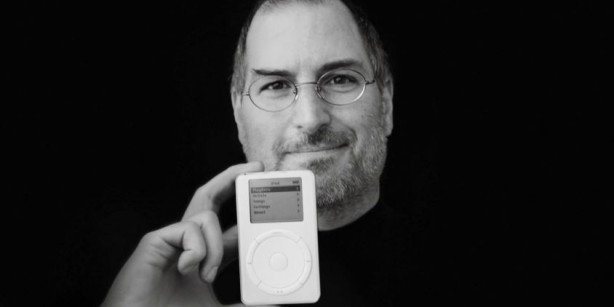 Tech
Tech
Celebrating the life and death of the iPod Classic
by Greg Bouchard
September 12, 2014
In the wake of one of their most over-the-top press events of all time this past Tuesday, Apple announced that they would discontinue production of the iPod Classic. None of us would’ve thought that something as ubiquitous as the iPod—or at least the original non-touch, non-iPhone, non-nano version—would go the way of the Walkman so quickly. Like other music listening technologies come and gone, it’ll leave a hole in our hearts—this one the size of an ever smaller and thinner rectangle. There’s no better time than now to look back at what the iPod was when it started, and what it became before getting pulled from the race.
It all started with the announcement of a “breakthrough digital device” at an Apple special event in 2001, held in what looked like a rented university lecture hall, at a time when video was still jerky and digital overhead projectors were high technology. Apple was building on its “digital hub strategy” of turning Macs into multimedia production and consumption machines. This included programs like iMovie, iTunes, iDVD, and Image Capture, which let you do things like burn a DVD, download songs from your digital camera, and make a movie “without even reading the owners manual.” The next step, though, was integrating the devices themselves and tweaking them to interact with these programs.
“What is iPod? iPod is an MP3 music player, has CD quality music, and plays all of the popular open formats of digital music…But the biggest thing about iPod is that it holds a thousand songs,” Steve Jobs said at the time. “Now, this is a quantum leap, because for most people it’s their whole music library.”
It was a clunky device by today’s standards, but it’s 5GB capacity and relative thinness—”the size of a deck of cards,” as Jobs boasted—were revolutionary at the time.
Then came the ads. First there was this one of a guy rocking out in the privacy of his living room, apparently before Apple could afford models and dancers.
Anyone who was interested in knowing more could look up this longer infomercial on the web. It featured interviews with celebrities gushing over the new device, like Moby!
They expanded the capacity to 10 GB, then 20 GB, then 40 GB over the span of a year and a half. In April 2003 they released the briefest and most overlooked addition to the iPod line: the third generation touch sensitive model. With no moving parts and illuminated buttons, it was sleek, cool looking in the dark, and awesomely futuristic.
A year later, Apple changed directions entirely and announced the iPod Mini with its sleeker appearance and now-famous click wheel.
Touting the click wheel as a major step forward in innovation—listen to the cheers in the audience—they may have overplayed their hand a little, and inspired spot-on parodies like this one from The Onion.
Still, the iPod Mini (soon to be replaced by the iPod Nano) and its click wheel were the beginning of the iPod we know it now. Your recently-obsolete iPod Classic still has that click wheel, and it’s about as thin as the Mini but with way more hard drive space. Even more importantly, the iPod Mini introduced Apple’s obsession with… colour!
Soon there was colour everywhere: iPods in different colours, colour screens, and aggressively brightly coloured commercials like these.
By this time, Apple had also gotten into hot water for allegedly being complacent in the widespread stealing and copying of music. As the owners of a major music store themselves in the form of iTunes, Apple never exactly encouraged stealing albums, but everyone knew that their device was the biggest enabler of theft since the invention of hands.
This is why starting in the mid/late-2000s, Apple increasingly ramped up their copy protection, sometimes in ways that irked consumers. First you couldn’t copy music from an iPod to a computer, then you couldn’t play iTunes albums unless you bought them, then you had to sync your music using iTunes instead of just dragging and dropping whatever you wanted onto your device. They also rolled out these “Don’t steal music” stickers, which were like writing “don’t speed” on the steering wheel of a Ferrari.
As part of Apple’s growing ambitions of taking over music distribution in addition to controlling the market for players, they became increasingly active in pushing iTunes through artist partnerships. We don’t have the exact statistics on us, but approximately 100 per cent of these involved U2. There was the U2 special edition iPod, inscribed with the band’s signatures, and the Complete U2 Digital Box set available only over iTunes. There was also the Product Red iPod invented by Bono to save Africa. This is all before U2 literally shoved their new album into the ears of all iTunes users this past Tuesday. For anyone who hasn’t been paying attention, Apple + U2 = <3 For Life.
When the iPod Touch and iPhone came out, with their drastically different interface and a completely different approach to media, Apple probably assumed users would jump ship from the iPod Classic. Quite the opposite: the value of the iPod classic was put into clearer perspective. Here was a device that could hold a mind boggling 160 GB of music without wasting any of that space on other function and was ridiculously tiny and durable. It was also great for anyone who didn’t want a smart phone, or who thought the paltry 8 GB of storage on their otherwise high-tech iPhone wasn’t enough to hold their music.
Why discontinue something that worked so well? There’s the obvious fact that more people have smart phones and fewer bother having a separate music player. There’s also Apple’s steady movement into cloud technology, toward a method of consuming music that relies on streaming instead of hard drive space. There are plenty of great possibilities surrounding this, but as Tuesday’s U2 stunt also showed, it can also get a little creepy. Will iPod Classic holdouts become the musical equivalent of survivalists? Maybe. But either way, we’re shedding a iTear or two for you today, iPod.
Tags: Tech, apple event, apple keynote, ipod, ipod classic, ipod commercials, Moby, steve jobs, u2











